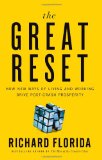The Great Reset by Richard Florida – Book Review
Richard Florida, author of The Rise of the Creative Class, takes a broad look at the current economic crisis in his latest book. Florida starts The Great Reset: How New Ways of Living and Working Drive Post-Crash Prosperity by examining past economic crises, and how the country emerged stronger from them. These crises, or resets as Florida labels them, are valleys in the country’s economic performance when obsolete and dysfunctional systems are replaced by “the seeds of innovation and invention, of creativity and entrepreneurship”.
While we are in the midst of a reset now, The Great Reset details how Florida believes we got here, and how we will emerge…
“The promise of the current Reset is the opportunity for a life made better not by ownership of real estate, appliances, cars, and all manner of material goods, but of greater flexibility and lower levels of debt, of more time with family and friends, greater promise of personal development, and access to more and better experiences. All organisms and all systems experience the cycles of life, death, and rebirth.”
As with his past work, the focus is on human capital. While cities like Detroit have difficult futures ahead, and it will be undoubtedly difficult to save every struggling city, Florida argues for continued investment in the people of those cities to aid in their mobility. Investments in education and improvements in the structure of service industry jobs (just like past resets did for other sectors), are just a few of the suggestions he has.
Milwaukee might be wise to heed some of the advice Florida offers…
So what can be done? Instead of spending millions to lure or bail out factories, or hundreds of millions and in some cases billions to build stadiums, convention centers, and hotels, use that money to invest in local assets, spur local business formation and development, better employ local people and utilize their skills, and invest in improving quality of place.
The Great Reset is a worthwhile read. Florida doesn’t offer perfect solutions to the problems we’re facing in Milwaukee and as a nation, but he provides thought-provoking analysis and insight into what ails us, and what might make things better. In a world where the Tea Party and a two-word mantra of “lower taxes” is what rules the day, it’s refreshing to read a more detailed and pragmatic take on what will guide us to prosperity in the future.
If you’re not yet convinced, Aaron Renn was able to post a lengthy excerpt of the book on his site.






















What “obsolete and dysfunctional systems” are falling apart now and being replaced, in Florida’s view? The recession is entirely a consequence of deregulated securities and commodities markets being driven from bubble/privatized profits to bust/socialized losses. Nothing has happened to suggest the cycle won’t be repeated as long as it possibly can be.
@Dan – I’m on the road, so I don’t have the book in front of me at the moment, but Florida seemed to focus around the idea that too high of a percentage of people own homes and therefore aren’t saving as effectively as they could be (in certain metro areas).
Does he break down a real argument for this? The quality and value of residential neighborhoods tracks owner-occupancy very closely, so I don’t get why Florida would see less distributed and more concentrated ownership (some kind of big rental system?) as a good thing, if it were even possible. A cure for inefficient savings is banks not giving out easy and excessive credit and then trading them around as AAA securities to inflate a bubble of phoney value. Americans just don’t save–and quit doing so–when subprime markets were opened and anybody could get credit/”free money.”
Trading them=trading toxic mortgages around. The speculation based bubble-bust model has not served cities well, so if Florida sees that as a failing system to be replaced, great, but if distributed ownership is his target, I don’t see the sense of that.
He has a bunch of data to show that it’s now economically efficient to own homes in certain areas (I believe at certain income levels and interest rates). He’s worked with that in past books. I takes plenty of shots at the subprime issue and ease of credit.
He doesn’t advocate for a huge number more renters. Still on the road, so I don’t have any numbers nearby, but Aaron Renn pegged it as such…
“The second point is about what Florida has taken to calling the “rentership society”. The term is provocative, but Florida actually only suggests pulling back from a peak of around 70% home ownership to 55-60%. He also suggests a pullback from ownership in other areas beyond houses as well.”
http://www.urbanophile.com/2010/05/09/review-the-great-reset-by-richard-florida/
Interesting, thanks. I am curious what the perceived value is in rushing into a rentier economy. It matters greatly who owns what.